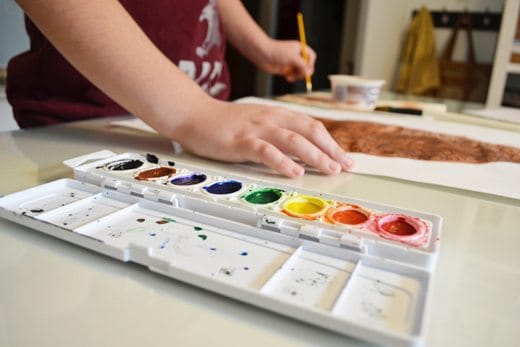
Building the Framework for Life-long Learners
I have always been curious about homeschooling and one thing I know is that we can all learn from these parent educators. And with that, I am honored to welcome Heather Sanders as a regular contributor. I have been a fan of Heather’s for years now and am looking forward to her sharing her educational insights.
~Isabel
********************
I am a homeschooling parent. This has not always been the case. My oldest child, who is now 16, was in a Montessori school for Pre-K and public school in Kindergarten and 1st grade; we began homeschooling when she was in 2nd grade. A few years later, we enrolled all three children – one in a private Pre-K, and the other two in public school for two years while my husband and I worked to pay off debts and save to buy a home. To date we have homeschooled for a total of 7 years.
Regardless of where a child’s learning occurs, it is my experience that most parents agree about the importance of taking an active role in their child’s education. As a home educator, I glean from the experiential wisdom of other homeschooling parents as well as friends who teach in public and private schools. Knowing how tremendously helpful this is for me, I believe the reverse is also true; there are many things parents of public or private schooled students can learn from homeschooling parents.
Change comes with greater understanding
Our homeschooling experience morphed through the years, starting from a naive, highly structured yet unattainable schedule, to a looser, but still structured curriculum-based schedule, and now, a blend of “curriculum + local cooperative + interest-led” learning.
As a home educator, I seek out truths about the basis of learning, making modifications to our homeschooling processes as the need becomes evident. This means I am responsible to ask questions when presented with new information. For instance, recently I debated whether learning should always be fun, and decided that no, it does not always have to be fun, but must strive to be intriguing while at the same time have real life, practical applications.
One of the things I believe everyone can learn from homeschooling parents is recognition of how the current educational system often fails students and what parents can supplement to off-set this deficit.
Memorizing is not the same as learning
In most public or private school systems a child typically advances to the next grade level when he reaches or exceeds a specific academic average in each of the required subjects for his current grade level. Basically, the completion of the required work is recognized as mastery.
However, mastery is defined as a “full command or understanding of a subject”, and unfortunately, what is becoming increasingly clearer, but what administrators are not ready to face, is that what test scores really measure is not a student’s individual mastery, but how she compares to her fellow students when echoing memorized material.
In his article, “What medical education can learn from homeschooling”, Craig Koniver, MD wrote, “The idea of learning the facts by themselves in an isolated manner makes no sense anymore…We are fooling ourselves thinking that random facts mean anything.”
Koniver’s family practices a style of homeschooling called “Unschooling” (also known as Interest Led Learning) where there is no curriculum and the kids choose what they want to learn and when they want to learn it. He supports this method of teaching based on his experience with traditional education, medical school, and working in the medical field. For instance, just as the Krebs cycle was “gibberish” to Koniver when he regurgitated it for a test, only becoming real when he was dealing with a patient with a mitochondrial disease, a child’s curiosity for learning is essential in order to reach mastery of the subject matter.
In other words, there is a difference between knowing and understanding the content, and the ability to regurgitate information on paper is totally meaningless. What kids memorize, they forget. Trying to force-feed MORE content into our kids’ heads, instead of watching and engaging them in their area of interests, does not equate to learning, and certainly not to mastery of content. The learning experience must be real – it must matter.
In his TEDxSinCity address, Dr. Wyatt Woodsmall stated, “We live in a world in which we are drowning in data. Data is increasing at an exponential rate, and most of it is absolutely worthless, and irrelevant…Organized information is knowledge. Knowledge plus experience equals understanding. Understanding plus more diverse experience equals wisdom. We don’t need to cram data into people’s heads. What this society desperately needs is wisdom.”
If one buys into this breakdown of how to obtain wisdom, it is clear that the path MUST involve experience, experience, and MORE experience.
Experience as a gateway to wisdom?
This past year, in our local homeschool cooperative, my son Kenny was expected to memorize all the 50 states and their capitols. He managed to do it quite effectively, but the states and capitols that required no prompting whatsoever were those we drove through in our 2011 family road trip that took us out of Texas and through Oklahoma, Kansas, Colorado, Wyoming, Montana, Idaho, Utah, Arizona, and New Mexico before returning home.
He knew where we were going (knowledge). At each stop, we experienced a taste of that state – from swimming in freshwater springs and climbing in caves, plummeting hundreds of feet underground to tour a salt mine, scaling Pike’s peak and exploring cliff dwellings, spying wildlife of all types like Elk and Bison, checking out hydrothermal areas in Yellowstone – including Old Faithful, viewing copper mines that can even be seen from space, standing in awe at the majesty of the Grand Canyon, as well as the Miraculous Stairway in the Loretto Chapel.
Experience, experience, and MORE experience.
Obviously, budget and time constraints limit most of us from plunging into that depth of experience on a day to day basis (it has been 2 years since our trip and we are STILL unable to take another), however, homeschooling on the road is not the only way to ensure students absorb information. Parents can provide opportunities for interest-based learning experiences after school and on weekends.
Kids learn when they are interested
Why is it important to pursue interest-based learning experiences? The perfect time for kids to gain an understanding of information is when they are interested. That particular time is not age or grade specific; the determining factor is level of motivation. Desire, coupled with readiness (ability) is key because, like the rest of us, kids essentially learn what they WANT to learn WHEN they want to learn it.
The parent’s role is to clue in to opportunities for teaching and provide resources (often the primary resource is TIME).
As an example, my son loves geography and LEGOs. His entire room is organized around these two themes.
I used this knowledge for his benefit when he was learning area and perimeter. After inspecting a fortress he built, it was easy enough to point out how he could calculate the area (the amount of space inside a shape) of his creation using the studs (the little “bumps” on top of LEGOs). He calculated the area of his rectangular structure by multiplying the length by the width.
Then, we established the perimeter (the distance all the way around his fortress) by counting the studs and adding them all together.
Easy enough, right?
This type of understanding can extend beyond the basics. When he needs to seed in his mind the various formulas for establishing the area of a parallelogram, rhombus, trapezoid, or even a shape that has to be broken down to several different shapes, we can still do this using LEGO structures.
It takes TIME.
It takes ENERGY.
It takes EFFORT.
Still, initiating this further development as a parent does two things; 1) it hones a particular skill set and 2) strengthens relationships as kids recognize that their parents are interested in what THEY are interested in. When we dig into their area of interest, we validate it – which is a reward in and of itself.
Sometimes our only job as parents is to step out of the way, like when Emelie and Kenny became absorbed in a self-directed project of drawing and water coloring human organs.
Kenny was studying Human Anatomy as part of his regular homeschooling, so he was already familiar with their shape and functions. Though their intention was not to create identical replications of each organ, they were somewhat consistent. I was impressed by the work they accomplished together.
They worked on this task for several days until they were tired of it and moved on to something else. Their interest was their motivating force, and my only job was to have the supplies at the ready (large 18 1/2 x 12″ sketchpads, Sharpies, watercolors and paintbrushes).
I have no doubt that the experience of this art project moved Kenny from basic knowledge to understanding. A few months later when his anemia led to blood transfusion after blood transfusion, there was much more discussion about the heart, another interest-based experience on a path to understanding and wisdom.
Building the framework for life-long learners means recognizing this path is never complete, but that, as parents, we need to assume a level of responsibility for learning or lack of learning that takes place while they are still under our care.
What sort of interest based or supplementary learning ideas have you integrated, or can you integrate, into your child’s education?
More Advice for Homeschooling Parents from Alpha Mom:
- Is There Such a Thing as Sort-Of Homeschooling?
- Homeschooling Selects Specialization Over Well-Roundedness
- Career-Minded Parents Can Homeschool Too!




